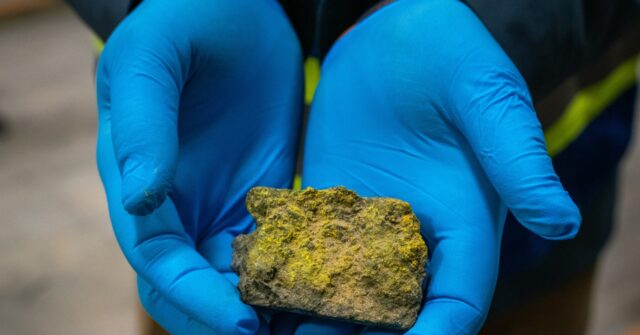A report by the International Atomic Energy Agency (IAEA) whose contents were revealed by multiple international media outlets this weekend expressed “serious concern” with the rapid rate of Iran’s uranium enrichment, which it reportedly claimed was enough to make one nuclear bomb a month in the past three months.
Uranium enrichment has been a critical topic of discussion in negotiations between Iran and the administration of President Donald Trump in the past two months. The talks, led by Trump’s Special Envoy for the Middle East Steve Witkoff and Iranian Foreign Minister Abbas Araghchi, have consisted in five meetings so far mediated by officials from the government of Oman. The two sides do not agree on the objective of the negotiations: Iranian officials say the goal is to lift American sanctions on their country, while the Americans have stated the objective is to end Iran’s illicit enrichment and nuclear weapons development.
High-level Iranian officials throughout the Islamist regime have insisted in the past month that they would not accept any limits on uranium enrichment, while Witkoff has insisted that halting enrichment is a “red line” for Trump.
According to the BBC, the IAEA – the United Nations’ official nuclear energy watchdog body – revealed in a recent confidential report to member states that it has reason to believe “Iran now possesses over 400kg of uranium enriched to 60% purity – well above the level used for civilian purposes and close to weapons grade, and a near 50% increase in three months.”
In comparison, a report by the IAEA in February indicated that Iran possessed 275 kilograms of enriched uranium at that time.
The report, also corroborated by journalist at the Agence France-Presse (AFP) and other outlets, highlighting how Iran’s enrichment is a significant outlier compared to other nations that use nuclear energy for peaceful purposes corroborates the Trump administration’s concerns with the program. During an interview in early May, Secretary of State Marco Rubio emphasized the fact that Iran does not need high-level enrichment if it is interested only in fueling nuclear power plants.
“They’re claiming they don’t want a weapon … but what they’re basically asking is to be the only non-weapon country in the world that’s enriching uranium,” Rubio told interviewer Sean Hannity. “And the level at which they enrich it is really not relevant, per se, because, really, if you have the ability to enrich at 3.67 percent, it only takes a few weeks to get to 20 percent and then 60 percent and then the 80 and 90 percent that you need for a weapon.”
“Iran simply needs to say, we’ve agreed to no longer enrich, we’re going to have reactors because we want nuclear energy, and we’re going to import enriched uranium. This is an opportunity for them if they take it. And this is the best opportunity they’re going to have,” Rubio asserted.
The IAEA stated that Iran’s recently produced enriched uranium is “enough for about 10 nuclear weapons if further refined, making Iran the only non nuclear-armed state producing uranium at this level.”
“Iran has produced highly enriched uranium at a rate equivalent to roughly one nuclear weapon per month over the past three months, the report found,” the BBC noted – a time period that overlaps with negotiations with the Trump administration.
“The significantly increased production and accumulation of highly enriched uranium by Iran… is of serious concern,” IAEA Director General Rafael Grossi reportedly wrote in the update.
The IAEA also reportedly accused Iran of maintaining secret enrichment sites intended to hamper the agency’s ability to monitor its nuclear activity.
“While Iran continues to cooperate with the agency on matters of routine safeguards implementation, in a number of respects … its cooperation with the agency has been less than satisfactory,” the agency reportedly lamented. “In particular, Iran has repeatedly either not answered or not provided technically credible answers to the agency’s questions and has sanitised locations as listed in this report, which has impeded agency verification activities.”
Grossi, the head of the IAEA, met with Araghchi, the Iranian foreign minister, in Egypt on Monday, alongside that nation’s top diplomat Badr Abdelatty. Few details are available at press time about that meeting, though Grossi stated on social media that he was grateful for Egypt playing a “constructive role;” similar praise for Iran was absent.
Iranian officials dismissed reports of the IAEA’s disappointment with the country, insisting it would under no circumstances abandon enrichment. Speaking to reporters on Monday, Foreign Ministry spokesman Esmaeil Baghaei insisted that the IAEA report was “politically motivated” and dismissed all data on Iran’s enrichment as fabricated by Israel.
“He also noted that any nuclear agreement must include the continuation of Iran’s uranium enrichment activities and an end to cruel sanctions against the nation,” the Iranian state outlet PressTV said, paraphrasing Baghaei.
The head of Iran’s nuclear energy agency, Mohammad Eslami, similarly proclaimed on Sunday that Iran would never stop its illicit enrichment, despite legitimate concerns that it has no reason to be enriching the material at such a high level if it is seeking only to develop a nuclear energy program.
“No one can claim Iran has no right to enrichment, because this matter falls within its own specific frameworks and requirements,” Eslami reportedly stated, arguing that calling for Iran to stop enrichment weapons-grade uranium was akin to banning the country from building power plants.
Follow Frances Martel on Facebook and Twitter.
Read the full article here


